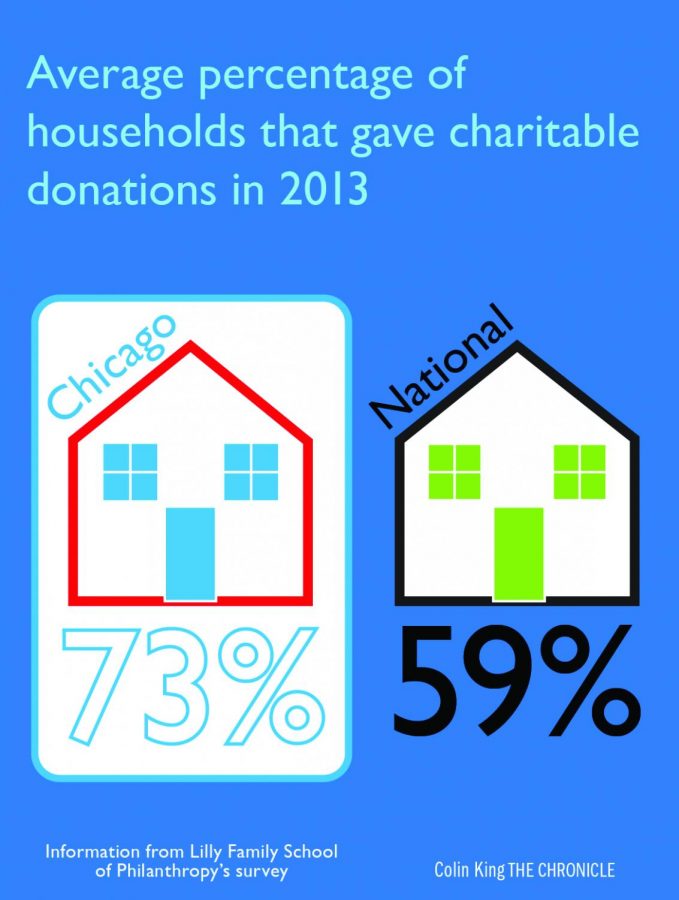Chicagoans more charitable than national average
Information from the Lilly Family School of Philanthropy’s survey
April 20, 2015
Chicago households, corporations and grant making foundations donate money at a higher rate than the national average, according to a survey conducted by the Lilly Family School of Philanthropy at Indiana University and sponsored by The Chicago Community Trust, called “Giving in Chicago.”
Chicago’s 73 percent average tops the national average of 59 percent for charitable contributions, according to the survey.
Chicago households, corporations and foundations donated a total of $10 billion to charities in 2013, according to the “Giving in Chicago” survey. Across the U.S., households, corporations and foundations donated a total of $335.17 billion to charities in 2013, according to the School of Philanthropy’s “Giving USA” study.
For both studies, the School of Philanthropy collected data from sample groups through telephone interviews, online surveys and tax forms. The same standards were used for both surveys, so each one could be compared to the other.
The Chicago study sampled 760 households and 70 companies in Chicago and surrounding regions including Cook, DuPage, Kane, Lake, McHenry and Will counties.
Una Osili, director of research at the School of Philanthropy, said the households and companies selected were from a higher income bracket because those are the groups most likely to donate money to charities and nonprofit organizations.
Jamie Phillippe, vice president of development and donor services at the Chicago Community Trust, 225 N. Michigan Ave., said the national survey is the No. 1 trusted survey by nonprofit organizations for information regarding philanthropy.
“The information provides us with baseline data so we can figure out how to grow and expand our philanthropic efforts in Chicago,” Phillippe said.
The study found that Chicagoans donate their time and money most to charities and nonprofit that focus on helping people fulfill basic needs like food and shelter.
Osili said philanthropy is increasingly important because government entities lack funding to provide services that help people acquire basic necessities.
Other communities would have to commission the School of Philanthropy to study their region before the Trust will be able to figure out why Chicagoans donate to charities at a higher rate than the national average, Phillippe said. She said the Trust will be able to determine what nonprofit organizations in Chicago can do differently to encourage more donations once it can compare donation trends in Chicago to other U.S. regions.
One possible reason for Chicago’s high rate of donations is that some nonprofit organizations have had longstanding Chicago roots, Osili said.
Eric Weinheimer, CEO of the Donors Forum, a regional association that aims to unite grant makers, nonprofits and corporations in charitable giving, said his organization has been based in Chicago for 40 years and has only recently expanded its reach statewide. He said his organization offers more programs in the city than other Illinois communities because it started in Chicago.
Because many corporate headquarters are located in Chicago and other companies have matching contribution programs—initiatives in which a company will match any charitable contribution an individual employee makes—Chicago may have a higher rate of donations to charities, said Thomas Mondschean, an economics professor at DePaul University.
According to the “Giving in Chicago” study, 76 percent of the companies surveyed said they choose to donate to organizations located in their area and 31 percent have matching contribution programs.
Weinheimer said some people stop donating their time and money because charities do not continue to engage them. He said to encourage philanthropy, organizations have to make charity exciting and worthwhile to their donors.
“People want to make a difference,” Weinheimer said. “People want to feel like their lives matter, and one of the ways to do that is through philanthropy.”
The Trust commissioned this survey because its centennial anniversary is on May 12. To commemorate the occasion, the Trust wants to celebrate philanthropy and make Chicago the most philanthropic area in the U.S., Phillippe said.
Phillippe said the Trust could not directly affect the number of groups that choose to donate, but she hopes by disseminating the information from the survey to other nonprofit organizations, those groups will be able to increase donations within their own organization.
“The study is not only about how much money people give to charity,” Osili said. “It’s about how much time, as well. A person’s time is as important as their money.”








